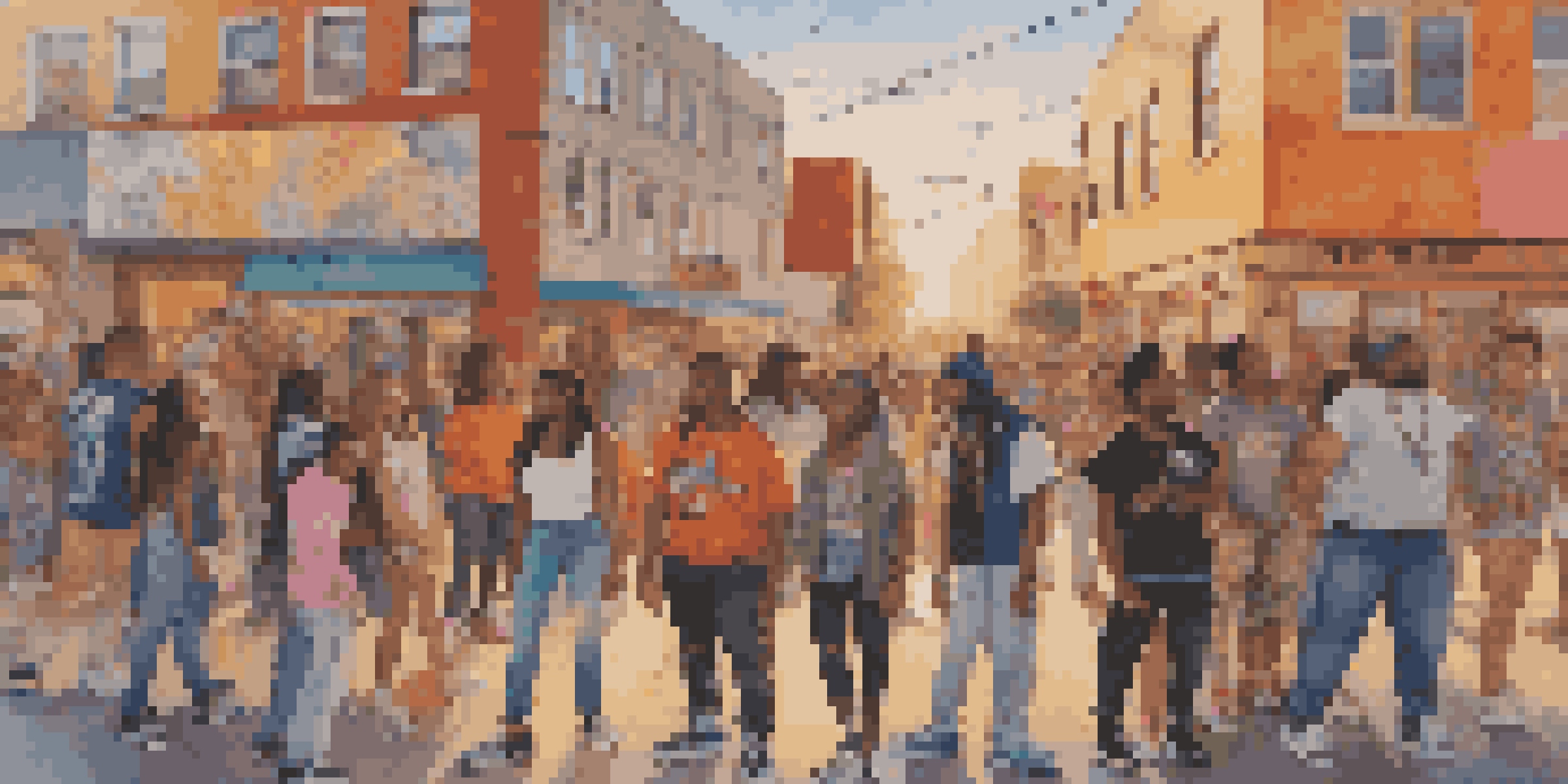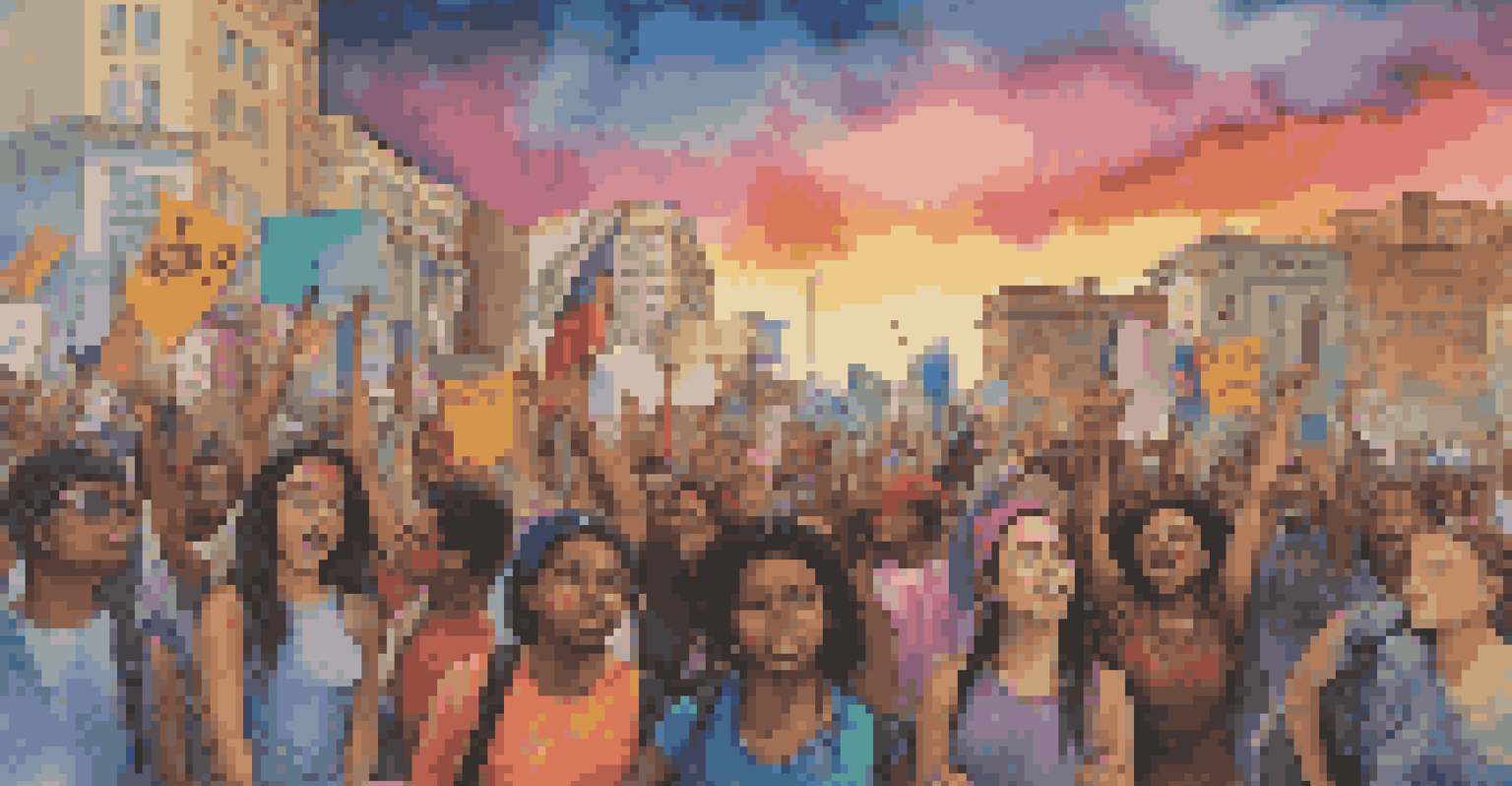Music Genres and Their Influence on Youth Identity Politics

The Role of Music in Shaping Youth Identity
Music has always been a powerful tool for expression, especially among youth. Through lyrics and melodies, young people often find a voice for their feelings and beliefs. This connection can significantly shape their identities, helping them navigate personal and social challenges.
Music can change the world because it can change people.
For many, music genres serve as a badge of identity, creating bonds with like-minded individuals. Whether it’s punk, hip-hop, or pop, each genre carries its own culture and values that resonate with different youth demographics. These connections can foster a sense of belonging that’s crucial during formative years.
Moreover, music can act as a catalyst for self-discovery. As teens explore various genres, they often encounter new ideas and perspectives, prompting them to reflect on their values and beliefs. This journey through sound can be an essential part of their identity formation.
How Genres Reflect Societal Issues
Music genres often encapsulate the societal issues of their time, serving as a reflection of the struggles faced by youth. For instance, hip-hop emerged from the socio-economic challenges of African American communities, providing a platform for expression and activism. This genre's roots are deeply intertwined with the narratives of resilience and resistance.

Similarly, punk music arose as a reaction against mainstream culture, often addressing themes like rebellion and anti-establishment sentiments. The raw energy and DIY ethos of punk are appealing to youth who feel marginalized or unheard. This genre illustrates how music can articulate the frustrations and aspirations of a generation.
Music Shapes Youth Identity
Through genres and lyrics, music provides a powerful means for young people to express their feelings, beliefs, and navigate their identities.
As young people engage with these genres, they become more aware of social justice issues, which can profoundly influence their political identities. Music thus serves not only as entertainment but also as a powerful medium for social commentary and change.
The Impact of Music on Political Activism
Music has historically played a significant role in political movements, inspiring youth to take action. From protest songs of the 1960s to modern anthems of social movements, music galvanizes individuals around shared causes. This connection between music and activism helps strengthen youth engagement in political discourse.
The music we listen to defines our generation; it reflects our ideals, our struggles, and our hopes.
Genres like folk and rap have been particularly influential in rallying young people for social justice. Artists often use their platforms to highlight critical issues, encouraging listeners to get involved. This can manifest in various forms, such as attending protests or advocating for policy changes.
The emotional resonance of music can motivate youth to express their political views more passionately. By harnessing the power of music, young activists can create a unifying force that amplifies their voices in the political arena.
Subcultures and Their Political Messages
Different music genres often give rise to unique subcultures, each with its own political messages. For example, the goth subculture embraces themes of individuality and self-expression, often challenging societal norms. This rebellion against conformity can prompt youth to question authority and advocate for change.
In contrast, the rave culture, with its emphasis on community and inclusivity, promotes messages of peace and acceptance. The values embedded in these subcultures can influence how young people perceive social issues and their role in addressing them.
Music as a Tool for Activism
Genres like hip-hop and folk have historically inspired youth to engage in political activism, using music as a platform for social change.
As youth immerse themselves in these subcultures, they often adopt the political ideologies associated with them. This not only shapes their identity but also empowers them to engage in broader social conversations.
Globalization and the Fusion of Music Genres
In our interconnected world, globalization has led to the fusion of various music genres, creating new sounds and movements. This blending reflects the diverse influences that shape youth identity today. For instance, genres like reggaeton and K-pop combine elements from different cultures, appealing to a global audience.
As youth embrace these hybrid genres, they also adopt the cultural and political narratives that accompany them. This exposure can broaden their perspectives, fostering a sense of global citizenship and awareness of international issues. Music thus becomes a vehicle for cross-cultural dialogue and understanding.
Moreover, the rise of social media platforms allows young people to share and discover these diverse genres easily. This accessibility empowers them to engage with a wider array of cultural expressions and political messages, further influencing their identities.
The Influence of Lyrics on Youth Political Views
Lyrics often serve as a direct reflection of the artist's beliefs and the socio-political climate. For youth, these messages can be incredibly impactful, shaping their understanding of complex issues. Songs that address topics like inequality, climate change, or mental health can resonate deeply, prompting listeners to reflect on their views.
Additionally, artists who articulate their political stances through their music can inspire fans to engage with these topics. When a popular musician speaks out on an issue, it can rally their audience to action, demonstrating the power of music in political mobilization.
Globalization Fuses Music Cultures
The fusion of music genres in a globalized world allows youth to explore diverse cultural narratives and broadens their perspectives on social issues.
As youth sing along to these lyrics, they internalize the messages conveyed, which can influence their beliefs and actions. This relationship between music and lyrics underscores the importance of thoughtful expression in shaping youth identity politics.
The Future of Music and Youth Identity Politics
Looking ahead, music will likely continue to play a pivotal role in shaping youth identity and political engagement. As new genres emerge and existing ones evolve, they will reflect the changing social landscape. Young people will undoubtedly harness the power of music to express their values and advocate for their beliefs.
Moreover, as technology advances, the ways in which music is consumed and shared will also transform. Platforms like TikTok and YouTube are already revolutionizing how youth discover and connect with music, providing new avenues for political expression. This evolution will further amplify the voices of young activists.

Ultimately, the relationship between music and youth identity politics will remain dynamic and intertwined. As long as there are stories to tell and issues to address, music will be a vital medium for youth to explore their identities and engage in political conversations.